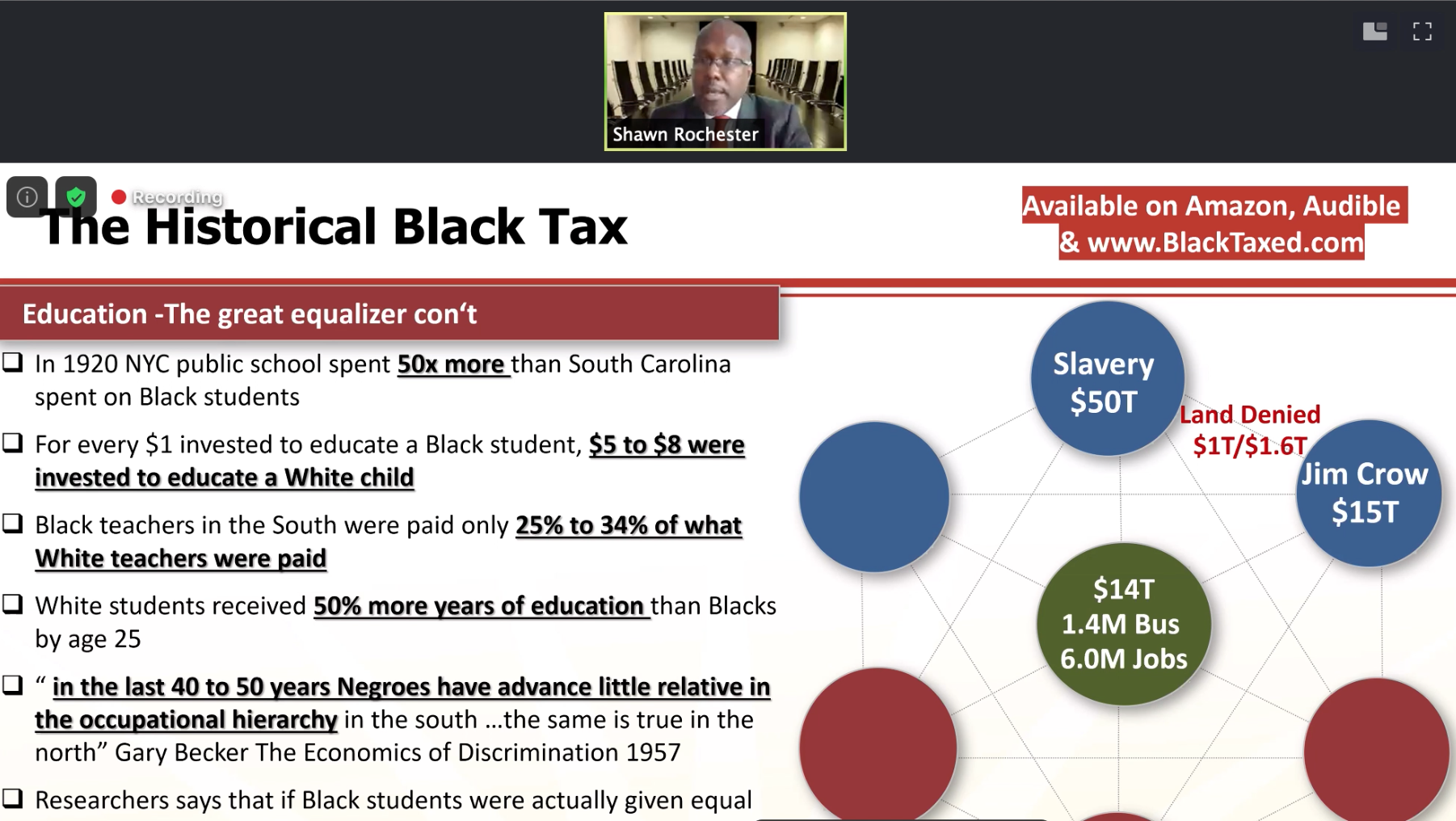Shawn D. Rochester discusses Black tax in America
Shawn D. Rochester discusses Black tax in America

Students and alumni gathered on Zoom to attend a Black History Month speaker event hosted by the Whitman School of Management’s Office for Institutional Culture. Held on Feb. 26, the event was organized by the executive director for institutional culture, Diane Crawford, and Whitman student inclusion leaders, Omari Romain ‘21, Jared Byrd ‘23, Noble Alden ‘21, and was moderated by Professor Herbert G. Ruffin II.
The guest of honor, Shawn D. Rochester, has been at the top of Crawford’s list for this event. She originally wanted to launch the Black History Month speaker series in 2019 but had to cancel due to a severe snowstorm. The coronavirus pandemic prevented Rochester from speaking last year, so Zoom was the safest and efficient way to do it in 2021.
“It’s been a year and a half that I’ve tried to get Shawn to speak here at a school,” Crawford says. “We’ve opened it up to the university because I think that we’re able to share and educate, not just reflect on Black History Month, but also as it pertains to racial equity today.”
Rochester presents this framework in his book, The Black Tax: The Cost of Being Black in America. He is also the founder of PHD Enterprises and CEO of Good Steward LLC (GSL), organizations that provide financial advising and work to increase Black employment and business in the American public and private sectors. This book illustrates how the history of past and current discrimination and systemic oppression financially impacts Black communities.
Rochester believes that this conversation is important for students of all races.
“They’re being trained to be future business leaders, they’re going to establish policies, they’re going to execute policies, they’re going to allocate resources that can have a tremendous impact on transforming the lives of folks,” Rochester said.
After working in personal finance management and educating people about cash flow, assets, retirement, and eliminating debt, he wanted to advocate for more Black entrepreneurship and employment and produced a detailed plan to do so in his book.
“I want to write the strongest possible case for commercializing Black enterprise for everybody,” Rochester said. “Not just for Black people, but for everyone from university, municipality, corporations, institutions, nonprofits, so on and so forth.”
Crawford says that one of Whitman’s goals is to accelerate global leaders. “And so how better to do that and ensure that our students and our faculty understand the financial ramifications of a very dark period in history,” Crawford said. “Shawn actually is able to monetize the tax placed on African Americans from the past and up until today, and what that’s worth, and then he lays out a really great framework.”

During his lecture, Rochester went through a historical timeline and broke down how African Americans were societally and economically impacted by slavery, the Civil War, sharecropping, and various other historical events. Rochester provided numerical evidence to quantify the tax placed on Black people in America and how it contributes to the wealth gap between Black and white Americans. He went on to discuss how these systems of oppression impacted education and housing for African Americans.
Rochester later transitioned into speaking about how marginalization and discriminatory practices against Black people affected the United States as a whole.
“What if Black Americans had been allowed to participate fully in the innovation that drove the economy?” Rochester said.
He explains that Black people were almost completely shut out of the 2.5 million patents created during the Industrial Revolution, with only 726 being created by Black people. If Black people had been given the innovative opportunity, 200,000 patents would have been created, Rochester said.
Whitman management student, Ifeoluwa Ojo ’23, was impressed after attending tonight’s lecture. “He just broke a lot of heavy topics down in a good way,” Ojo said. Ojo learned about the social impacts of slavery, but Rochester added more depth to the conversation.
“In 2020, a lot of heavy topics have been brought up, but to understand the social and economic effects more deeply, makes things more clear,” Ojo believes that this particular conversation is important for college students to understand Black students’ journey to college.
“We all have people at home that we are trying to make proud,” Ojo said. “For them to learn this history is very important.”
Rochester ended his lecture by explaining that innovation drives the economy, and the United States suffered a loss at the hands of racial inequity.
“There is also an extraordinary cost that the whole country pays,” Rochester said. “This helps emphasize the importance of developing and deploying skills across the board.”





